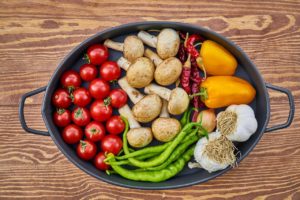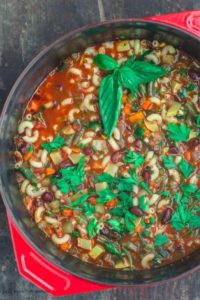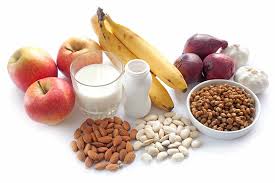Editor’s Note: this post is taken from Dr. Michael Gregor’s NYT best-selling book, “How Not to Diet.” As the New Year is underway, we’re doing a 10-part series on the latest evidence-backed ways to lose weight and keep it off.
“A plant-based diet is like a one-stop shop against chronic disease.”
– Michael Gregor, M.D. –
Main point: anti-inflammatory foods boost weight loss
One of the most important medical discoveries in recent years was the realization that inflammation appears to play a role in many of our chronic diseases, including at least eight of our top ten leading causes of death.
Inflammation has been thought to be a good thing. When you get a splinter, and your finger gets red, hot, painful, and swollen, that’s your body’s reaction to tissue damage or irritation. If that type of inflammation is part of the healing process, why is inflammation also linked to chronic disease?
While a splinter reaction is an example of acute inflammation, a short-term response aimed at resolving a problem, chronic inflammation lasts for a long type and perpetuates disease.
Throughout our lifetime, as we encounter unhealthy parts of our environment like traffic pollution, toxic chemicals in cigarettes, chronic stress, and even a lack of physical activity or sleep, our immune system becomes chronically inflamed.
That being said, the primary driver of meta-inflammatory chronic disease is the portion of our environment we introduce into our bodies: what we eat.
What Foods Cause Chronic Inflammation?
Broadly speaking, researchers have found parts of processed foods and animal products, like saturated fat, trans fats, and cholesterol, to be pro-inflammatory.
On the other hand, researchers have found whole plant foods, containing fiber and phytonutrients, are strongly anti-inflammatory.
What are the Effects of Chronic Inflammation?
The higher a food scores on the Higher Dietary Inflammatory Index, the greater probability of it contributing to obesity, heart disease, impaired kidney and liver function, and worsening mental health. For example, inflammatory diets are linked to higher rates of depression, anxiety, and impaired well-being.
Eating a more inflammatory diet is associated with 75% increased odds of having cancer and 67% increased risk of dying from cancer.
Obesity, Inflammation, Saturated Fat

Scientists now know obesity is partly caused by chronic inflammation damaging the appetite-regulating apparatus in our brains.
Researchers have found inflammatory foods like saturated fat, commonly found in animal products like bacon, milk and cheese, and eggs, cause brain inflammation in the hypothalamus, the center of appetite regulation.
By increasing saturated fat intake, you can reversibly induce negative changes in brain function, mood, inflammation, resting metabolic rate, and even motivation to exercise. In addition, one’s appetite increases, making it more likely one will overeat and store energy in fat cells.
Anti-Inflammatory Foods
By choosing to eat more anti-inflammatory foods and fewer pro-inflammatory foods, we may be able to prevent and treat the damage to the appetite-regulating apparatus in our brains that can lead to–and sustain–obesity.
In the Dietary Inflammatory Index, the single most anti-inflammatory food is the spice turmeric, followed by ginger and garlic. The most anti-inflammatory beverage is green or black tea. The two most anti-inflammatory food components are fiber and flavones.
Dietary fiber
Dietary fiber is found in all whole plant foods, but it is most concentrated in legumes, like beans, split peas, chickpeas, and lentils.
Flavones
Flavones are plant compounds concentrated in herbs, vegetables, and fruits. The leading sources in the U.S. diet are bell peppers, celery, apples and oranges.

Pro-Inflammatory Foods
The most pro-inflammatory food components are saturated fat and trans fats. The top five sources of saturated fat in the United States are cheese, desserts like cake and ice cream, chicken, pork, and burgers.
Where to Go From Here
To maximize your weight loss (and mental health and wellbeing), focus on engineering your diet to be anti-inflammatory. Focus on eating whole, plant-based foods. Swap inflammatory foods, like grilled chicken breast or cheesy pizza, for plant-based protein sources, like lentils or beans.

Main point: choose anti-inflammatory foods to jump start your weight loss
Question to Ponder
What is the one food I most eat that is inflammatory? What can I switch to eating in its place?
Resources
